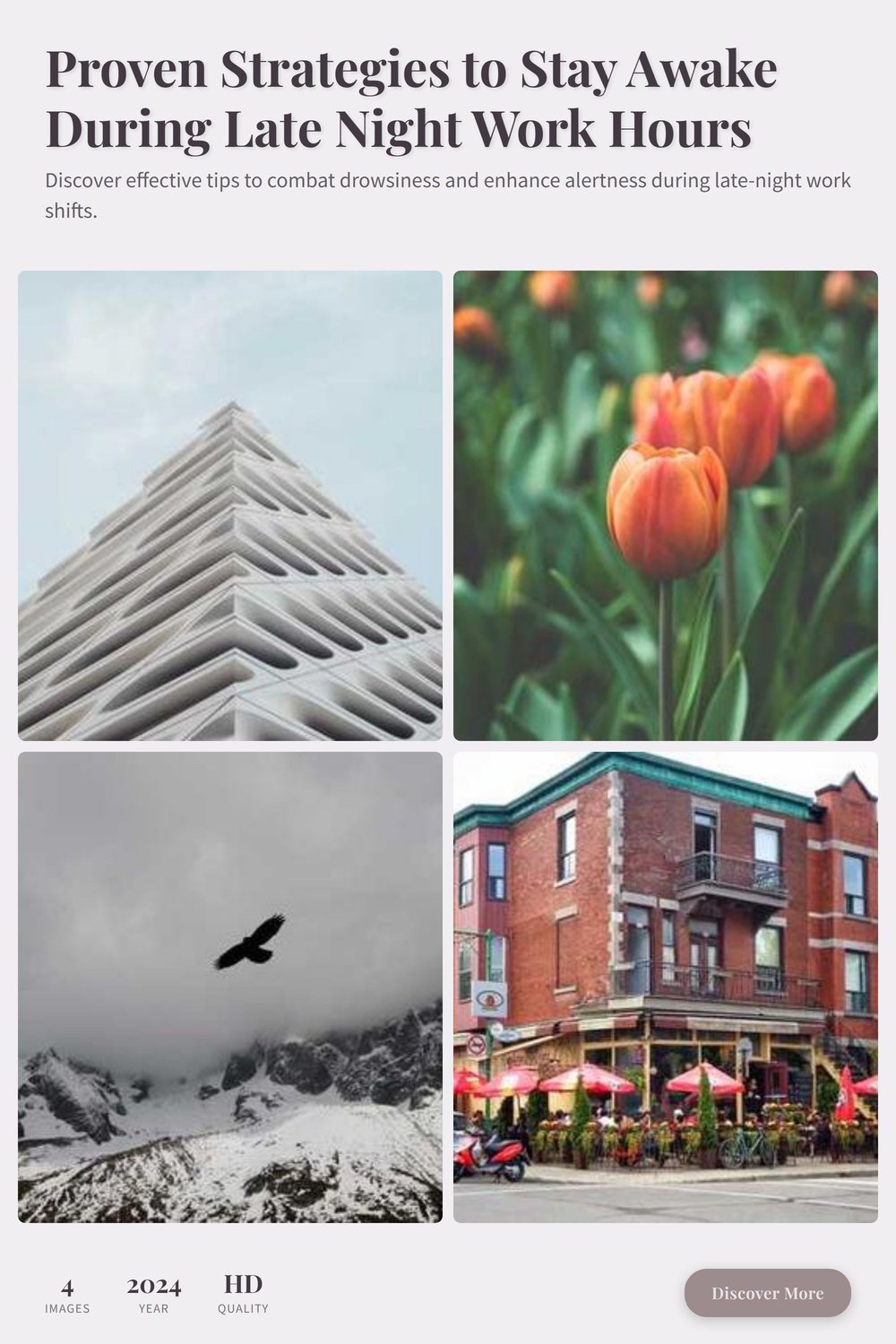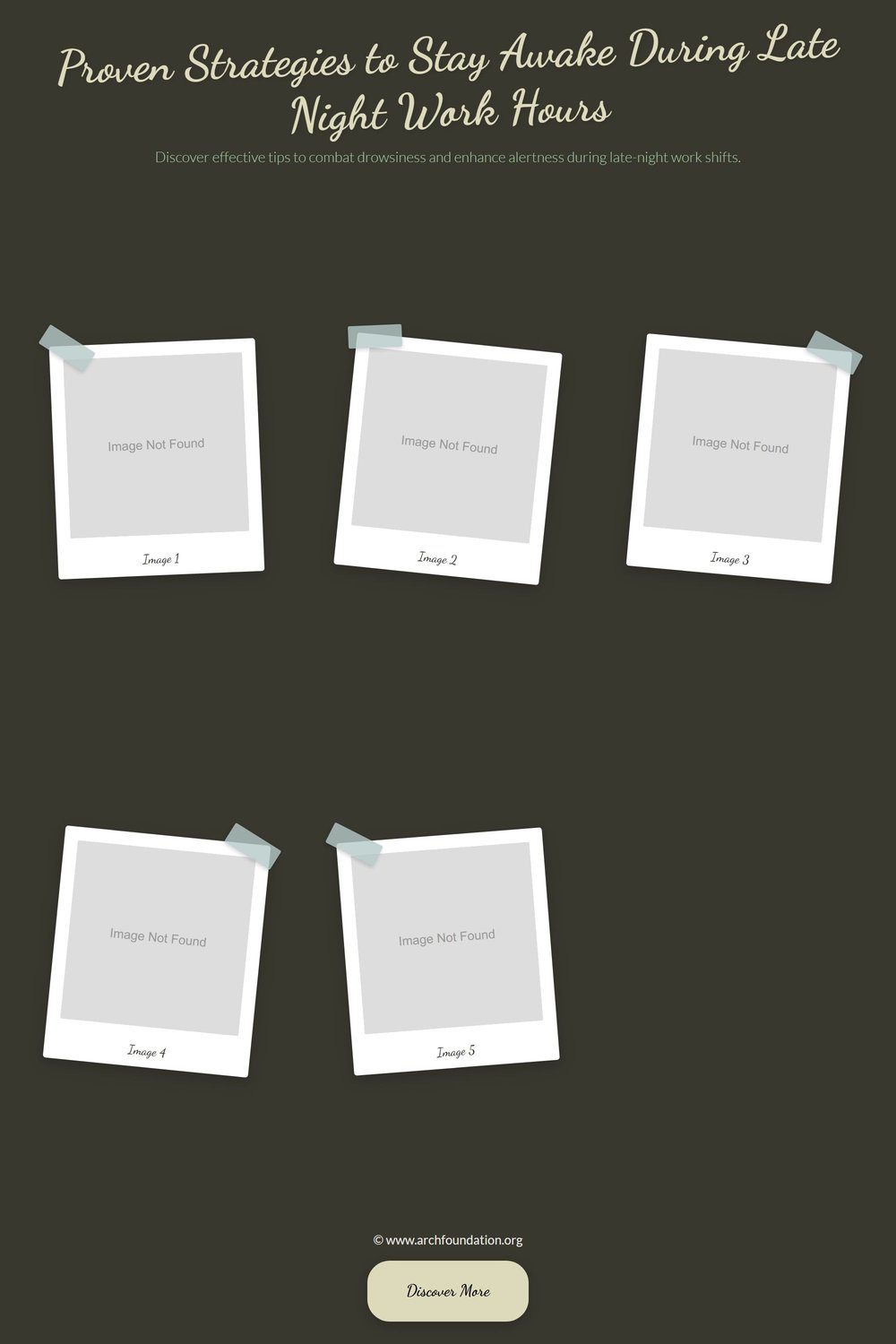Your cart is currently empty!

Proven Strategies to Stay Awake During Late Night Work Hours
Proven Strategies to Stay Awake During Late Night Work Hours
Late-night work is often unavoidable for many due to job requirements, despite its adverse effects on health. If you find yourself needing to stay alert during these hours, this comprehensive guide will provide valuable strategies to help maintain your focus and productivity.
1. Effective Techniques to Combat Drowsiness at Night
Utilize Tea or Coffee for Enhanced Alertness
One of the most popular methods to stave off sleepiness is by consuming tea or coffee. Both beverages contain caffeine, a stimulant known to momentarily enhance brain activity and sustain alertness. For optimal results, aim to drink a cup of tea or coffee approximately 30 minutes post-dinner. However, avoid consuming these beverages too late to prevent overnight restlessness. If you’re sensitive to caffeine, consider alternative methods as this might not be suitable for you.

Stay Hydrated to Instantly Revive Alertness
The human body is naturally inclined to rest at night. Working late can disrupt this cycle, leading to dehydration and increased fatigue. Drinking a refreshing glass of water can instantly invigorate your senses and restore alertness, crucial for maintaining concentration during late hours.
Employ White Lighting for Improved Focus
Working under white artificial lighting can effectively mimic daylight, thereby reducing drowsiness by tricking your visual senses. Not only does this help protect your eyes, but studies have shown that white light can significantly boost concentration levels during work or study sessions. Ensure the light intensity is comfortable for your eyes to prevent strain or discomfort.

Incorporate Regular Breaks for Mental Relaxation
Integrating short breaks, lasting between 5 to 10 minutes, throughout your work routine can alleviate mental fatigue. Engage in light exercises, stand up, or take a brief walk to relax your mind and body. This practice is also beneficial for those working in office environments during the day.
Energize Your Mind with Music
Music is a powerful tool that can invigorate your mood and cognitive functions. Upbeat tracks are particularly effective in maintaining a lively spirit, even during late hours. However, keep the volume low to avoid auditory strain and to ensure better focus on your tasks without getting distracted by lyrics or melodies.

Stimulate Specific Body Points to Ward Off Sleep
When fatigue sets in, consider stimulating certain body areas to fend off drowsiness. Try gently tugging your earlobes, relaxing your limbs, rotating your shoulders, or engaging in deep breathing exercises to rejuvenate your senses.
Prioritize Daytime Rest
If your schedule demands late-night work, allocating more rest time during the day is crucial. Quality daytime rest can ease the strain of staying up late. Although achieving deep sleep during the day can be challenging, consider these tips for better rest:
– Practice yoga or meditation before sleeping to calm your mind and reduce stress.
– Avoid clock-watching; focus on even breathing.
– Opt for soft, comfortable sleepwear and bedding.
– Regularly change and clean your bed linens.
– Use essential oils for relaxation and stress relief.

Engage in Conversations for Mental Engagement
Social interactions with friends or family can temporarily distract from tiredness. However, manage these conversations to ensure they do not interfere with your work.
2. Health Risks of Frequent Late Nights
Sleep is crucial for health, allowing your body to replenish energy. While various methods can help combat nighttime drowsiness, excessive late-night activity can lead to serious health issues:
– Cognitive decline due to impaired neuronal function, leading to memory issues and sluggish brain processes.
– Emotional instability, resulting in irritability and prolonged fatigue.
– Weight gain from inadequate rest.
– Premature skin aging, including wrinkles and acne.
Recent studies highlight that insufficient sleep correlates with increased mortality and stroke risks, particularly in adults sleeping less than five hours a night. Such individuals have double the mortality risk compared to those with adequate sleep, including heightened cardiovascular concerns.
Ultimately, while job or study obligations may necessitate late nights, it’s vital to prioritize a balanced schedule allowing for 7-8 hours of sleep daily. This balance ensures comprehensive well-being and energy for all activities.
While these strategies to combat nighttime drowsiness can be effective, consider adjusting your workload where possible. Completing tasks during daylight can help align with your natural circadian rhythms, promoting optimal health and productivity.
“`html
Stay Awake Recipe
Here’s a quick guide to help you stay alert during late night work hours.
Ingredients
- 1 cup of tea or coffee
- 1 glass of water
- White artificial lighting
- Music (preferably upbeat)
Instructions
- Enjoy a cup of tea or coffee 30 minutes after dinner to boost alertness, but avoid it too late.
- Stay hydrated with a refreshing glass of water to revive your senses.
- Use white artificial lighting to mimic daylight and improve focus.
- Listen to upbeat music to energize your mind, keeping the volume low to prevent distraction.
- Take regular 5-10 minute breaks to relax your mind and body.
- Engage in light exercises or gentle body stimulation, like tugging earlobes, to ward off sleep.
- Prioritize daytime rest to ease the strain of late nights.
- Engage in light conversations for mental engagement without interference.
Notes
While these strategies help manage late nights, prioritize a balanced schedule for optimal health and productivity.
“`
“`html
What are some effective techniques to stay awake during late-night work hours?
Effective techniques include consuming tea or coffee for caffeine, staying hydrated, using white lighting, taking regular breaks, listening to upbeat music, stimulating specific body points, and engaging in conversations for mental engagement.
How does white lighting help improve focus during nighttime work?
White lighting mimics daylight, which can reduce drowsiness by tricking your visual senses. It has been shown to significantly boost concentration levels during work or study sessions, while also protecting your eyes from strain.
Why is staying hydrated important when working late at night?
Working late can disrupt your body’s natural rest cycle, leading to dehydration and increased fatigue. Drinking water can instantly invigorate your senses and restore alertness, which is crucial for maintaining concentration during late hours.
What are the health risks associated with frequent late-night work?
Frequent late-night work can lead to cognitive decline, emotional instability, weight gain, premature skin aging, and increased risks of mortality and stroke due to insufficient sleep. It is important to balance your schedule to ensure 7-8 hours of sleep daily.
How can daytime rest help those who work late at night?
Allocating more rest time during the day can ease the strain of staying up late. Techniques such as practicing yoga or meditation, avoiding clock-watching, and using essential oils can improve the quality of daytime rest, which is crucial for recovery and maintaining energy levels.
“`

Leave a Reply